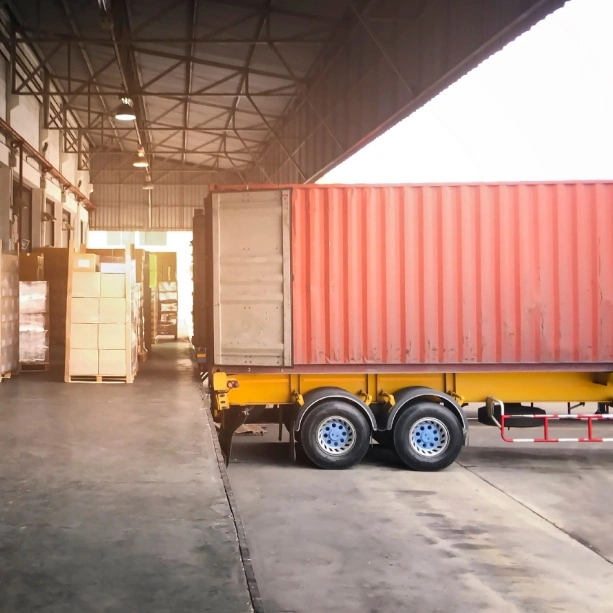When it comes to pursuing logistics success, efficiency and visibility are key. One technology that has revolutionized the industry is container tracking systems. These systems provide real-time information about the location and status of containers, offering a range of benefits for businesses involved in shipping and logistics. Container tracking systems are advanced technologies that allow companies to monitor the movement and status of their containers throughout the supply chain. These systems use a variety of tracking technologies to provide real-time information about the location, condition, and status of containers, giving fleet managers the advanced fleet tracking capabilities that an increasingly competitive market demands and setting them up for future success. But how do you know if a container tracking system is right for your company?
Increase Your ROI by Investing in AirFinder Everywhere
- Loss Prevention. Reduce the amount of loss that occurs during the supply chain process
- Location Coverage. AirFinder Everywhere uses a combination of GPS, Cellular, and WiFi to determine location everywhere
- Security Alerts. Know when a delay in shipment has occurred so the problem
can be addressed immediately.
What is a Container Tracking System?
A container tracking system is a technology that allows companies to track the location and status of their containers as they move through the supply chain. These systems typically use a combination of GPS and other tracking technologies to provide real-time information about the location, condition, and status of containers. This same concept can also be applied to tracking pallets and other units of cargo being transported.
Container tracking systems are usually components of a larger fleet tracking system that provides visibility across a wide range of logistics assets. A robust fleet tracking system will allow you to track your trailers, cargo, portable equipment, and more on both overhead and granular levels. These systems should be able to provide real-time location, condition, and custody data on the individual containers or other units in order to truly be considered to have a container tracking component. The goal is to provide visibility at the level of the individual shipment or cargo to gain better insight and control over your fleet management operations.
Reasons to Use a Container Tracking System
Using a container tracking system comes with numerous benefits that can both help you solve specific problems within your logistics process and just generally set up your logistics operations for excellence. The reasons you might want or need to use one of these systems lies within these benefits. If any of these benefits match with your problems or priorities for your logistics operations, then investing in a container tracking solution is likely the right choice for you.
Prevent Loss and Theft
Loss of cargo can result from various factors, including misplacement or mishandling. Trailer tracking solutions primarily prevent such losses by providing real-time location updates. With a container tracking function, however, you gain visibility of each individual component of the shipment so that you know exactly what goes missing when, and ideally, where to find it. This enables companies to monitor cargo locations closely as they traverse the supply chain, allowing fleet managers to swiftly rectify any movement discrepancies or separations from the group. Immediate awareness of such issues enables timely interventions, reducing the likelihood of cargo being lost or overlooked.
Container tracking is also instrumental in thwarting cargo theft, a practice in which cargo is removed from the trailer in order to resell the goods. Using a container tracking system provides real-time visibility into container locations throughout the supply chain, enabling swift detection of any unauthorized movements. This constant monitoring allows companies to detect any deviation from the planned route or unauthorized container departures from facilities, facilitating rapid responses to theft or suspicious activities. Such immediate awareness also aids in promptly alerting law enforcement agencies, increasing the likelihood of recovering stolen cargo and apprehending perpetrators.
Provide Transparency for Customers and Stakeholders
In a climate where consumer expectations for transparency and accountability are escalating, container tracking systems offer companies the means to satisfy these demands. These systems provide real-time updates and information on the status of shipments, allowing companies to keep customers informed while effectively managing their expectations. While companies cannot eliminate all transportation issues, as many are linked to uncontrollable factors such as traffic or weather conditions, tracking containers and cargo offers the real-time visibility needed to promptly alert fleet managers of any delays, allowing them to preemptively alert customers awaiting their shipments and make efforts to address the delay from there. After all, most customers and other stakeholders will understand these explanations, but they expect to be informed in a timely fashion. Not doing so and waiting until they contact you about delays puts your company’s reputation at risk, as it communicates dishonesty from the customer perspective. On the other hand, by leveraging the high level of visibility afforded by container tracking, companies can enhance transparency, providing customers with detailed information and fostering loyalty and understanding even when the worst happens.
Ensure Compliance with Regulatory Standards
Compliance regulations are pivotal in safeguarding the quality and safety of perishable goods. Adhering to industry-specific regulations represents a complex and crucial facet of logistics operations, and a container tracker presents valuable tools to facilitate compliance. And it’s not just about maintaining those conditions, either; it’s about being able to prove that those conditions were maintained during inquiries and audits. Numerous industry, health and safety, and other government regulations necessitate meticulous records of cargo transport, encompassing departure and arrival times, routes taken, and handling conditions. Container tracking systems automate the generation of these records, mitigating the risk of human error and ensuring that requisite documentation is readily accessible for regulatory bodies.
One form of compliance that is especially critical within logistics operations is cold chain compliance, which applies to food, pharmaceuticals, chemicals, and other perishable goods. The maintenance of specific temperatures is paramount for preserving these perishable assets to avert spoilage and subsequent health hazards. While reefer trailers allow for the setting and monitoring of overall temperature range for the trailer, they cannot provide data on the actual temperature of individual containers or units. This is a problem, as most temperature fluctuations occur on a more granular level, with specific containers or products not maintaining their temperature due to blocked vents, improper loading, packaging damage, or shifting during transit. To this end, container tracking devices are equipped with embedded sensors that continuously monitor the cargo's temperature on this more granular level. In the event of a breach in the safe temperature range, fleet managers receive immediate notification of the drop for the given container, enabling prompt action to prevent spoilage.
Maintain Reliable Custody Records
Container tracking technology can also serve as a tool for ensuring custody records and employee accountability. Accountability is paramount for upholding operational efficiency and adhering to industry regulations. By providing a detailed and precise record of container movements and corresponding custody data, including departure and arrival times, routes taken, and handling conditions, container tracking enables companies to verify employee compliance with established procedures and schedules. Any deviations from planned routes or unauthorized stops can be quickly identified and addressed, ensuring adherence to protocols and the safety of the end customer while contributing to a more efficient and compliant supply chain.
Factors to Consider When Choosing a Container Tracking System
If you’ve decided that you do, in fact, need a container tracking system, your first question will probably be something along the lines of, “Well, where do I start?” This is a fair question, as there are many logistics tracking systems available on the market, each with their own strengths, but difficult to distinguish at first glance. When choosing a container tracking system, there are several factors to consider. These factors include:
- Cost and ROI. How much will you need to pay for the system, including both upfront costs and maintenance? Also, how much time and money will the installation help you save?
- Integration Capabilities. Can the system integrate with your existing telematics and supply chain management systems? If it does, it will greatly reduce the learning curve that comes with a new installation.
- Visibility Level. Does the system provide granular visibility, or does it only provide overhead visibility for trailers? For the benefits of container tracking, a system that can track individual contents of a trailer is a must.
- Real-Time Visibility. Can the system report a product’s location in real time, no matter where it is? If a system requires manual scanning, its applications are going to be limited and require more time from your workers.
- Condition Monitoring. What conditions, if any, are the tracking devices equipped to monitor? Do these align with the conditions that you require monitoring for?
- Customer Support. How difficult is it to get in contact with and receive assistance from the team behind the solution? You’ll want to know that you’re supported in installation and beyond.
By assessing these factors, you can begin to narrow down which container tracking system is the best fit for your company’s needs, allowing you to reduce the time you spend searching for a solution and pursue a full installation sooner.
Start Your Investment Process Today
Container tracking systems provide a wide range of benefits for companies involved in shipping and logistics, spanning from loss prevention to condition monitoring and customer transparency to employee accountability. By providing real-time information about the location and status of containers, pallets, and other units of cargo, these systems can help companies improve efficiency, enhance security, and reduce costs. Investing in a container tracking system is a smart move for any company looking to stay competitive in today's fast-paced world of logistics. To learn more about our AirFinder Everywhere solution for container tracking and beyond, book a demo with our team today.





